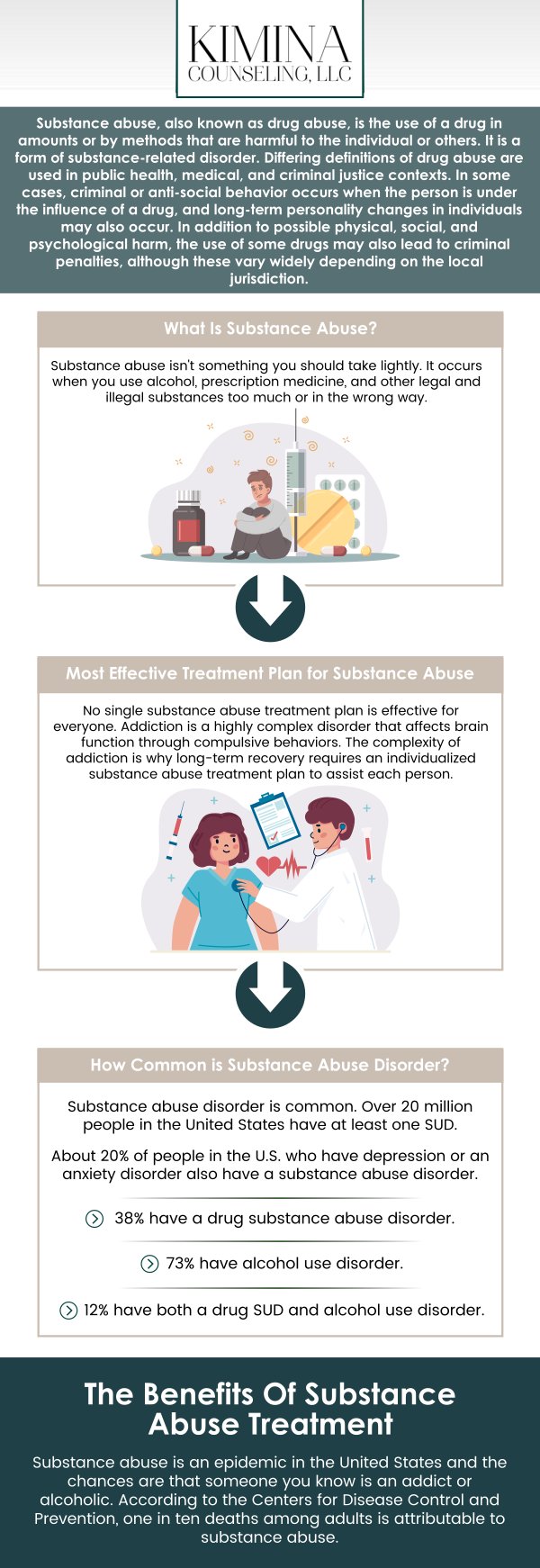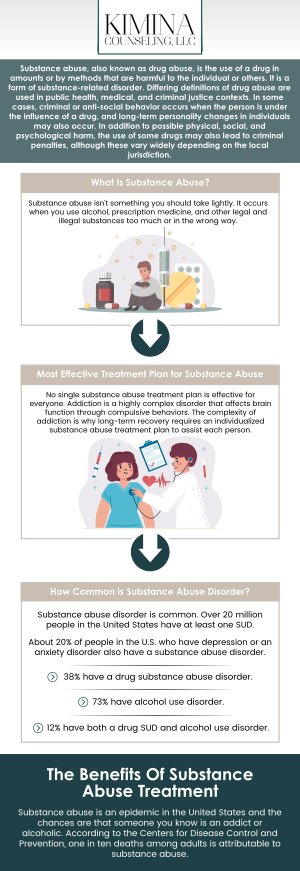Substance Use Disorder (SUD) Treatment in Auburn, MA
Substance Use Disorder (SUD) is a chronic condition characterized by the compulsive use of substances despite negative consequences, leading to physical and psychological dependence. It often involves increased tolerance, cravings, and an inability to control or reduce substance use. At Kimina Counseling, LLC, our team offers personalized therapy and support to help individuals address the root causes of SUD and work toward recovery. For more information, contact us or schedule an appointment online. We are conveniently located at 7 Midstate Drive, Suite 202, Auburn, MA 01501.


Table of Contents:
What is substance use disorder?
What are the symptoms of substance use disorder?
How does a substance use disorder develop?
How is substance use disorder treated?
Substance use disorder (SUD) is a chronic condition characterized by the harmful or hazardous use of substances such as alcohol, drugs, or prescription medications. Individuals with SUD may develop a strong psychological and physical dependence on these substances, often leading to compulsive behavior and an inability to control their use. This disorder can significantly affect various aspects of a person’s life, including relationships, work, and physical and mental health.
The signs of substance use disorder may include frequent cravings for the substance, withdrawal symptoms when not using, neglecting responsibilities or activities due to substance use, and continued use despite negative consequences, such as legal issues or health problems. SUD can manifest as mild, moderate, or severe, depending on the frequency of substance use and its impact on the individual’s life.
SUD often co-occurs with other mental health issues, such as depression, anxiety, or trauma, complicating the treatment process. It is typically treated with a combination of behavioral therapies, counseling, and support groups.
Recovery from substance use disorder is possible with proper treatment, support, and a commitment to change. Early intervention and a comprehensive treatment plan are key to achieving lasting recovery.
Substance use disorder (SUD) manifests through a range of physical, behavioral, and psychological symptoms that reflect a person’s inability to control or stop using substances despite negative consequences. Common symptoms of SUD include:
⦁ Increased Tolerance: Over time, individuals with SUD may need more of the substance to achieve the desired effect due to the body’s adaptation.
⦁ Withdrawal Symptoms: When the individual attempts to stop or reduce substance use, they may experience physical symptoms such as nausea, sweating, tremors, headaches, or anxiety.
⦁ Cravings: A strong desire or urge to use the substance, often overwhelming the individual and making it difficult to resist.
⦁ Neglecting Responsibilities: Substance use may interfere with daily activities such as work, school, or family responsibilities, leading to a decline in performance or neglect of obligations.
⦁ Failed Attempts to Quit: Individuals may have tried unsuccessfully to quit or reduce their substance use multiple times, indicating a loss of control.
⦁ Continued Use Despite Harm: Despite facing negative consequences, such as legal problems, health issues, or damaged relationships, individuals continue to use the substance.
⦁ Social and Relationship Issues: Substance use can lead to strained relationships and social withdrawal, as individuals prioritize substance use over social connections.
These symptoms can vary in intensity depending on the severity of the disorder, but they typically interfere significantly with a person’s ability to function in daily life. Treatment for SUD involves therapy, counseling, and support to manage cravings and promote recovery.
Substance use disorder (SUD) develops through a combination of biological, psychological, and environmental factors. Initially, individuals may experiment with substances due to curiosity, peer influence, or stress relief. Over time, repeated use leads to changes in the brain’s chemistry, particularly within the reward pathways, resulting in increased tolerance. As a result, individuals may require higher amounts or more frequent use to achieve the same effects.
The brain’s altered state can make it increasingly difficult for individuals to find pleasure or satisfaction in daily activities without the substance. This shift often causes intense cravings, compulsive behavior, and a lack of control over substance consumption. Factors like genetic predisposition, pre-existing mental health conditions, trauma, and stressful life events can also increase the risk of developing a substance use disorder.
As the disorder progresses, it disrupts various aspects of life, including personal responsibilities, relationships, and physical health. Individuals often struggle with withdrawal symptoms when attempting to quit, further reinforcing their reliance on the substance. Without intervention, this cycle can become harder to break.
At Kimina Counseling, LLC, we understand how complex substance use disorders are. Our team works to address the root causes through tailored therapy and support, guiding individuals toward lasting recovery and healthier coping strategies.
We recognize that substance use disorder requires compassionate, individualized care. We approach treatment through a holistic combination of psychological therapies, social support, and lifestyle improvements. Our process begins with an in-depth assessment conducted by our experienced therapists to fully understand your personal history, substance use patterns, and any co-occurring mental health concerns. This thorough evaluation allows us to develop a personalized treatment plan tailored specifically to your unique needs and goals.
Psychological therapies form the cornerstone of our approach. Our skilled clinicians utilize evidence-based methods such as Cognitive-Behavioral Therapy (CBT). These therapeutic modalities empower you to identify and transform harmful thought patterns, build healthier coping skills, and enhance your motivation and confidence for lasting recovery.
We also emphasize the importance of social support throughout your recovery journey. Kimina Counseling encourages engagement with peer recovery networks, support groups, and community resources, providing you with opportunities to gain encouragement, connection, and shared understanding. Our counselors also work closely with family members, offering education and guidance to ensure your loved ones can effectively support your healing process.
Long-term recovery requires ongoing support and regular monitoring. At Kimina Counseling, we provide consistent follow-up appointments and counseling sessions to track your progress, address any challenges, and refine your treatment approach as needed. Additionally, we encourage and support sustainable lifestyle modifications—including improved nutrition, regular exercise, stress management techniques, and the development of healthy daily routines—to enhance your overall well-being and strengthen your commitment to a substance-free life.
At Kimina Counseling, LLC, we believe successful treatment comes from a compassionate, evidence-based, and comprehensive approach, empowering individuals to achieve lasting recovery and a meaningful, fulfilling life. For more information, contact us or schedule an appointment online. We are conveniently located at 7 Midstate Drive, Suite 202, Auburn, MA 01501. We serve patients from Auburn MA, North Oxford MA, Worcester MA, Grafton MA, South Worcester MA, Newton Square MA, and surrounding areas.

Check Out Our 5 Star Reviews


Additional Services You May Need
▸ Individual Therapy
▸ Couples Conseling
▸ Family Counseling
▸ EMDR Therapy
▸ Anxiety
▸ Depression
▸ Trauma
▸ Post-traumatic stress disorder (PTSD)
▸ Bipolar Disorder
▸ Serious Mental Illness (SMI)
▸ Parenting and Post-Partum
▸ LGBTQ+
▸ Phobias
▸ Grief
▸ Attachment Disorders
▸ Personality Disorders
▸ Obsessive Compulsive Disorder
▸ Substance Use Disorders
▸ Family Conflict
▸ Attention Deficit (ADHD)
▸ Behavioral Therapy
▸ Anger Management

Additional Services You May Need
▸ Individual Therapy
▸ Couples Conseling
▸ Family Counseling
▸ EMDR Therapy
▸ Anxiety
▸ Depression
▸ Trauma
▸ Post-traumatic stress disorder (PTSD)
▸ Bipolar Disorder
▸ Serious Mental Illness (SMI)
▸ Parenting and Post-Partum
▸ LGBTQ+
▸ Phobias
▸ Grief
▸ Attachment Disorders
▸ Personality Disorders
▸ Obsessive Compulsive Disorder
▸ Substance Use Disorders
▸ Family Conflict
▸ Attention Deficit (ADHD)
▸ Behavioral Therapy
▸ Anger Management






